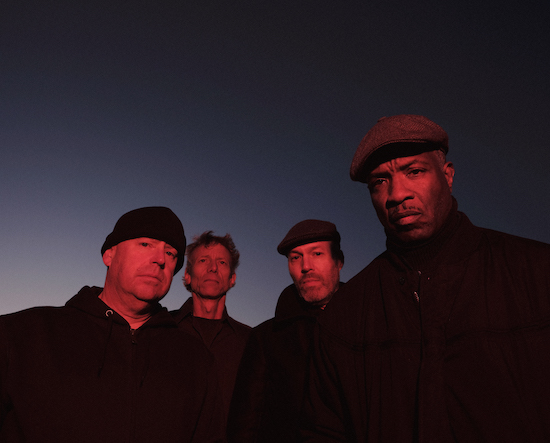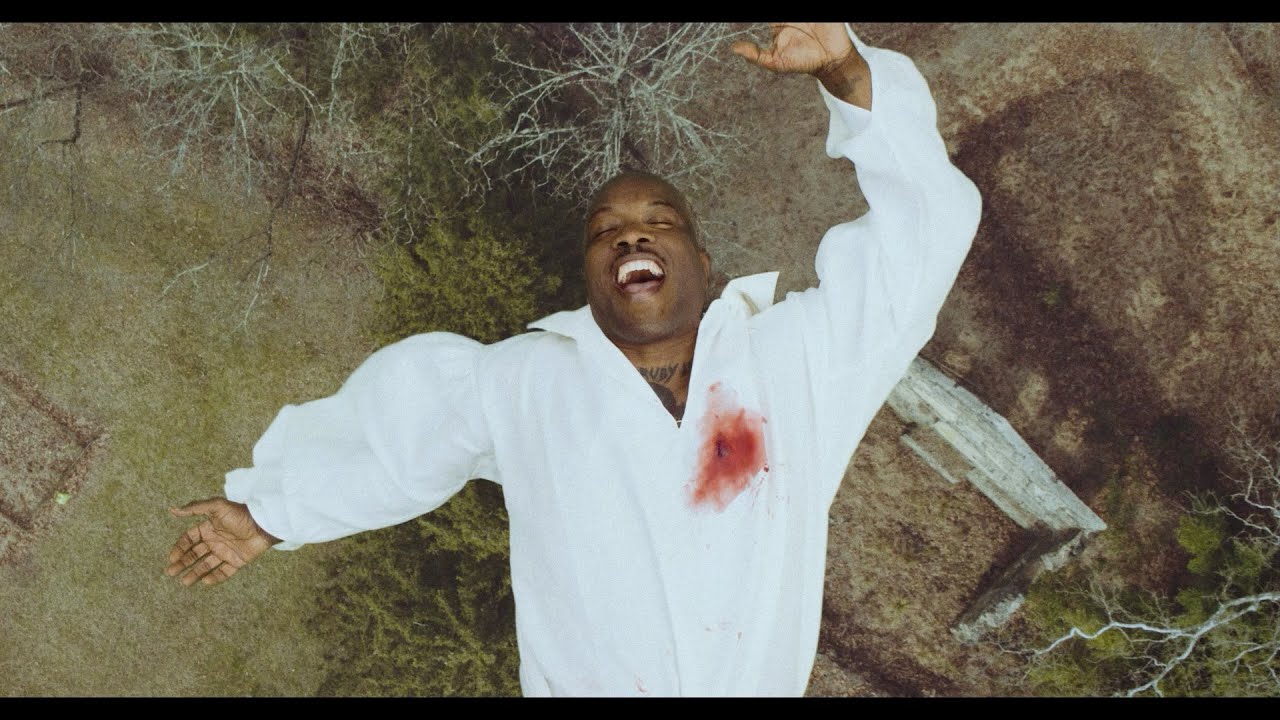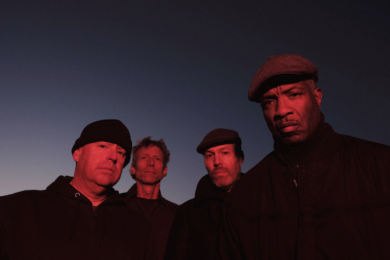Bands love to describe their music as having an “unclassifiable” or “hard-to-pigeonhole” sound. In very few cases is this true. Oxbow are a rare example of these labels being accurate. Across a discography that spans 34 years, the band have incorporated elements of noise rock, art rock, post metal, blues, jazz, neo classical, and baroque pop into their recordings, but none of these genre descriptors come close to conveying what their music sounds like.
Oxbow originated in San Francisco in 1988 as a means of frontman Eugene Robinson putting a suicide note to music. Robinson, and the guitarist, Niko Wenner, from the hardcore band he was fronting, Whipping Boy, combined with alternating drummers Tom Dobrov and Greg Davis (with Whipping Boy drummer Dan Adams joining on bass soon thereafter) to form a quartet that could perform this articulation of despair. This would become Oxbow’s 1989 debut album, Fuckfest.
The band made their live debut in London in 1990, before releasing second album King Of The Jews the following year. This record incorporated bluesy elements into the band’s music and was in keeping with Fuckfest‘s confessional tone, but the darkness of this album and its follow-up, Let Me Be A Woman, felt less autobiographical.
From fourth album Serenade In Red until recently, Oxbow have felt like they have been telling ostensibly fictional stories, while still incorporating elements of the band’s lived-experience. They have developed a reputation as a visceral and abrasive live act, but the live albums 12 Galaxies and Stone & Towering Edifice: Live At The BAM both document more stripped-down and vulnerable performances of their songs than those often experienced at their shows. Following the epic meditation on sex addiction that was An Evil Heat, Oxbow documented the stories of semi-fictional protagonists like Frank Johnson on sixth album The Narcotic Story in 2007 and the titular Thin Black Duke ten years later.
They are now turning their attentions to the subject of love with their eighth studio album, and first outside of their initial seven-album cycle, Love’s Holiday. As the record’s title suggests, its songs are underpinned by ambiguity over whether its narrators are experiencing an absence or an abundance of love. Love’s Holiday features guest vocals from the likes of Lingua Ignota and Jellyfish’s Roger Joseph Manning Jr. and is Oxbow’s most melancholic, but by no means darkest, album to date. It is also their most personal since Let Me Be A Woman.
Guitarist and music-writer Wenner has explained that the album’s music was “chiefly inspired by and written for my family. We’ve had two children born and my father died while writing and working on this record”. Lead vocalist and lyric-writer Robinson has added that it has always bothered him “that no one understood that our songs were love songs. Now, listening to a record of exclusively love songs, I can see why no one saw that.”
‘Curse’ from Fuckfest (1989)
Niko Wenner: “I’d asked Klaus Fluoride [Dead Kennedys] to play bass on ‘Curse’ after Greg and I recorded the drums and guitars live together. Klaus came in and said, ‘I should play this six-stringed bass made by Fender.’ Everybody knows it now. At the time, it was kind of unknown. It had a whammy bar on it. Klaus is an amazing musician and a great bass player, so he nailed it.”
Eugene Robinson: “The first time I met Klaus was when we hijacked a show as Whipping Boy. We [turned up and] played three songs at a show that we were not booked to play. And people threw garbage and bottles at us. Afterwards, Klaus walked up to me, said, ‘Who are you?’ I said, ‘We’re Whipping Boy, and I’m Eugene.'”
‘Woe’ from King Of The Jews (1991)
ER: “I had initially kind of pre-figured that Fuckfest would be a suicide note to the universe, or more specifically, to the person who was causing me to have suicidal ideation. By the time we had gotten to King Of The Jews, I think it was as a result of Fuckfest being well-received.
“Full credit where credit is due, Kevin Martin is the one who was running our record label Pathological back then. He saw some promise in it and invited us over to [the UK to] play. That was probably around the end of me thinking, ‘Ah, well, before I die, I should probably see England.’ [LAUGHS] So going from Fuckfest to King of the Jews was when I started to realise that maybe suicide was an impractical solution to whatever temporary problem I was having.”
‘1000’ from Let Me Be A Woman (1995)
ER: “I can’t think of any song that is more upfront about my intentions, in the sense that there wasn’t a lot attraction, for me in the idea of staying on this planet, than ‘1000’. Several people seemed to bond specifically with this song. Some of them ended up leaving the planet later in actual fact.
“I became friends with Eilidh Bradley from the band Solar Race, [and it turned out] she had recorded with [Steve] Albini, but that wasn’t the entrée. The entrée was when she talked about how much the song ‘1000’ meant to her. She ended up playing live with us at least once, possibly twice, singing the female vocal line in that song. Sadly, she ended up dying in 2014. The song has a certain amount of power; a dark kind of power, but this was completely born in me having a similar sensation when I contemplated life on this planet.”
‘The Last Good Time’ from Serenade in Red (1996)
NW: “‘The Last Good Time’ was borne of an interim period. Tom Dobrov played live with us until 1995, and Greg Davis has played live with us since. There was the interim period after we first toured Europe in 1995, came back, Tom left, and we didn’t have a drummer. We recorded a rehearsal with another drummer. That’s the beginning of that song.
“More so, it came from when I played with Kevin Martin’s band, GOD. I spent a lot of time with the bassist, Dave Cochrane. He does that super-distorted bass and plays harmonics. That’s what the guitar does. It’s tuned down to a low C and hits the harmonics, so it’s a Dave Cochrane bass riff that I’m playing on guitar. It’s in seven but it rolls along, so it doesn’t have any of the jagged feel that that kind of metre can.”
‘Stallkicker’ from An Evil Heat (2002)
ER: “This entire record, for me, documented a certain aspect of something that people question whether it’s a real addiction or not. That would be a sex addiction, but it’s never that simple. People who have problems with cocaine or with alcohol or heroin – not a single person who becomes addicted to heroin didn’t know it was addictive before they started doing it.
“With sex addiction, there’s a knowingness about it: how do you know you’re not just a guy who gets lucky? Maybe it’s when you realise you’re not enjoying any of it.”
NW: “The music came from a rehearsal. Our bass player, Dan Adams, came into rehearsal and said, ‘My uncle just died.’ It was a very spooky night. We were recording rehearsals at that time. We just started playing ‘Stallkicker’. There you have an interesting way to describe Oxbow, these two things [lyrics about sex and death] put together.”
‘Down A Stair Backward’ from The Narcotic Story (2007)
ER: “The intention was for this song to document Frank Johnson’s drug addiction. Also, it was a lyrical dissection of the difference between desolation and isolation. I mean, the [John Donne] line ’No man is an island’? Like hell, I was thinking. Of course, we’re all these wonderful, glorious islands.”
NW: “The riff came from a rehearsal recording. I remember rehearsing with strings for another performance we had and one of the violinists just started complaining. She said, ‘This is too dissonant. It’s wrong. I can’t play it. We need to fix that.’
“The violist was a friend of mine and she said, ‘You need to play what’s on the page. We’re hired to perform this music. I think it’s great. The composer’s right here. If you can’t do it, then…’ The violinist finally gave in and acquiesced. That was a fun song to do.”
’She’s A Find (Live)’ from 12 Galaxies (2008)
NW: “When I think about that gig, I think first about performing with our fantastic collaborator, oboist Kyle Bruckmann. Kyle was able to hold long tones, like a human voice can. The studio recording has electric guitar and bass, a piano, and strings, all of which can give ringing tones. That gig was electricity-free. Dan played a cello. I played my old Martin D-18 acoustic guitar, which has nothing of the ring that a piano or an electric guitar has.
“The challenge as I saw it was both a limited set of instruments, specifically ones with sustain, but most particularly the guitar. How to make work the far more limited volume contrast in the acoustic instruments, and the severely limited sustain of the acoustic guitar in a very slow and repetitive song? Kyle’s playing proved essential to the solution. The answer for the guitar part is full commitment to the challenge at hand, and concentration on the minutia of tone and sustain that are available.”
’Ecce Homo (Live)’ from Stone & Towering Edifice: Live At The BAM (2011)
How did it feel performing this then-new song about a new character (the Thin Black Duke) in front of a relatively big audience?
ER: “It was uncomfortable. The only other song I recall this being done with was ‘Million Dollar Weekend’ from Love’s Holiday. It was a ronin song, so not having found a place for it, I was actually convinced to sing it before I was standing in front of a mic recording it. The good part of this was that like with every other Oxbow song, I had months of practice listening to it and letting it form itself in my head, so I couldn’t massacre it terribly.
“I also made sure to do a version of it that would not imprint my understanding of the song with any lazy or bad habits. So it worked out in both instances. Well enough so the songs sound like something cool, but not so well that I want to change how I record vocals for any other Oxbow song.”
‘Cold & Well-Lit Place’ from Thin Black Duke (2017)
NW: “That was written on electric guitar. I thought, ‘This has melody in the guitar. It’s probably okay.’ What makes it Oxbow is the brass I added later. That came from walking through San Francisco, seeing the UC Berkeley brass band playing in a park, playing what university brass bands play: up-tempo stuff.
“I thought, ‘This sucks. Why don’t they do something interesting?’ As a composer, instead of complaining, your job is to ask what alternative would be good? They should have two tones that slide towards each other and come to another interval.”
ER: “What I love most about it is the creepy-crawl aspect of the interval when it’s climbing. If you’ve ever taken large quantities of psychedelics, it puts your teeth on edge. You can see when I’m playing it live, I’m recalling that sensation where it starts to grind on the periphery. It always recalls, for me, [the music from] Spaghetti Westerns, so [it’s a] fine, fine song.”
‘Icy White & Crystalline’ from Love’s Holiday (2023)
How did you come to incorporate references to potentially dark themes like “prostitution” and “prosecution” into a love song?
ER: “You do understand this is the same guy who wrote An Evil Heat? [LAUGHS] In my mind, there’s no discontinuity between any single act of prostitution and the possibility of love in an enduring form. It doesn’t seem strange or discordant to me, lyrically. You have to take my word that it is 100% a love song.
“Imagine yourself for a second, after having spent a wonderful weekend with your lover, you get a call. You pick up your phone later. It’s a message from her. She says, ‘I’ve been arrested.’ ‘What did they arrest you for?’ ‘Prostitution.’ You can imagine that would be an interesting day for you. Not marked by any kind of form of anger or upset, it should be noted as well. It’s just another day.”
Love’s Holiday is out via Ipecac on Friday. Oxbow tour Europe and America this Autumn
Oxbow play this year’s Supersonic Festival which runs 1 – 3 September




